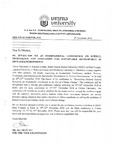Building Household and Community Resilience to Food Insecurity through Kitchen Gardens in Las Anod District of Somaliland
Abstract
The number of acutely food insecure households in the Las Anod region is estimated at 134,000 with a further 80,000 households classified as stressed (FSNAU 2018). Las Anod's economy is mainly centered on livestock. ADRA is currently implementing the Somali Resilience Program (SOMREP) to build household and community resilience to drought and other risks. in times of severe drought and times of conflict and displacement, communities become food insecure as their livelihood systems are disrupted. Lack of modern farming technologies limits the potential output of the farming activities and therefore the need to improve. Kitchen gardening is an innovative project that can be initiated to provide instant aid to communities by self-production of fresh vegetables. The purpose of this project was to train and capacitate women members of the Village Savings and Loan Association (VSLA) groups to start up container and bag gardens at the household levels in order to increase the variety of foods eaten and mitigate against food security. A total of 191 women from twelve villages were trained in July 20218. A follow up assessment in August- September indicated that 42.4% of the households had fully embraced the container farming technology and the vegetables were thriving. A further 36.6% had attempted planting however the crops did not thrive for various reasons. The remaining 20.9% did not attempt planting. Benefits reported by the participants were; increased vegetable consumption at household level 86.4%, access to fresher vegetables 76.1%, less water usage compared to land gardening 91.3%, less space 88.9%, and easier pest control 77.9%. Various benefits can emerge from kitchen gardening in practices such as health and nutrition, improved food security, enhanced income and self-employment in dry land environments such as Somaliland.
Collections
- Conferences [33]

